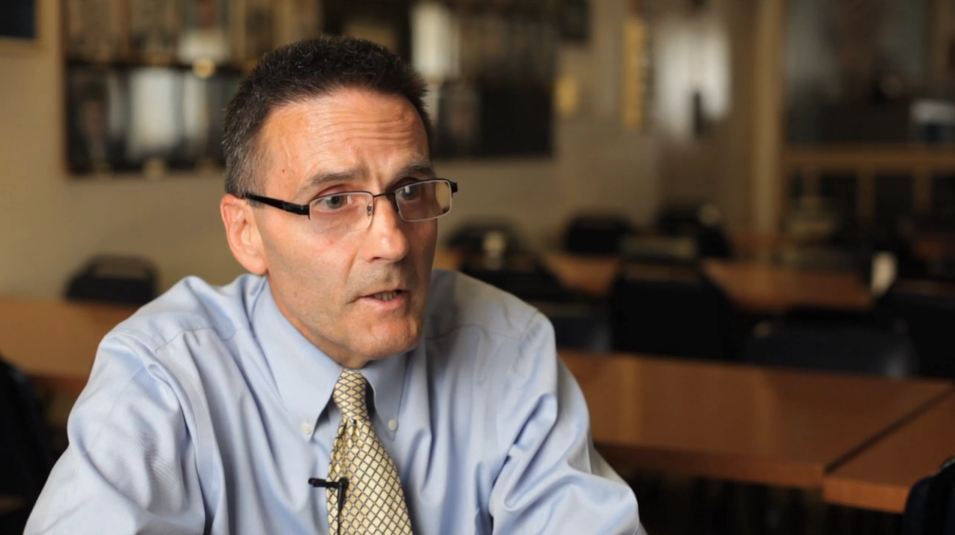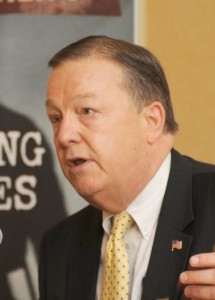How Soldier On Hired 92 Formerly Homeless Veterans – A Series by The Ithaca Voice
ITHACA, N.Y. — Martin Warren pulls what looks like an identity card from his wallet. He is a clean-cut, slender man dressed in a brown tweed jacket. He wears thin-framed spectacles.
He places the card on the table between us. There is a photograph of someone: Barely recognizable underneath a long, unkempt beard and wild, matted hair.
“State of Connecticut, Department of Correction, Inmate Identification Card”, it reads.
“About seven years ago, I was homeless,” Warren says. “I was living on the streets. After two years wandering aimlessly from dumpster to dumpster, I was arrested for vagrancy.”
The man pictured on the card is Warren, although it is impossible to tell.
Warren is part of a team from the largest non-profit for veterans, after the US Department of Veterans Affairs, which came to meet with the Ithaca Voice in June to talk about its work in Tompkins County.
Five members of Soldier On, including Jack Downing, the CEO, travelled four hours from Massachusetts to Ithaca. We talked about Hope on the Homefront and how we could link the series with the work they do for veterans in our area.
Of the 20 outreach workers that work in Central and Eastern New York, 15 of them are formerly homeless veterans, including Warren.
VIDEOS: How org. hired 92 formerly homeless veterans
Partway through our meeting Downing had interjected: “Martin, why don’t you tell us where you were eight years ago?”
Warren had been a Navy specialist officer from 1973-1977, and was one of the soldiers to deploy on the first Nuclear Task Force in Naval history, but he had ended up destitute. In 2006 he had met a man called Willie Ledbetter, who was working for Soldier On, in a homeless shelter. That man was to prove to be his savior some months later.
“After years of poor choices I found myself without any resources living in a cardboard dumpster,” Warren told me. I lost hope, I didn’t have family and had burned all my bridges.”
Warren’s eyes briefly glassed over with tears. Blinking hard, he returned the ID card to his wallet.
What is ‘Soldier On?’
Soldier On, founded in 1994, deals specifically with homelessness and veterans in crisis, although it runs several other services. At the simplest level, it gets homeless veterans off the streets and into shelters, hospitals, clinics and addiction treatment centers. In New York State there are 21,147 homeless veterans, including 846 homeless women veterans, according to data from the VA.
See related: Homelessness Map from The Long March Home
Downing says that Soldier On now serves 18 counties in Central New York – including ours – and 18 counties in Eastern New York. At the meeting was Martin , Dominick Sondrini (formerly a Marine) and Tyrone Byrd (a Vietnam era veteran) all of them local outreach workers for Soldier On.
We discussed the issues that face rural veterans: homelessness is not just an urban problem. Warren serves the Ithaca area and travels 1,200 miles in his RAV-4 car, which is equipped to operate as a mobile office.
See related: Opinion: Rethinking the delivery of veterans’ benefits
The business model for Soldier On is designed to reach the veteran anywhere they are – something that has made the agency hugely successful: so much so they were awarded $12,757,000 in VA Supportive Services for Veteran Families (SSVF) grants in 2013 to expand their services further across the East Coast and beyond (36 counties in eastern upstate and central New York, 36 counties in central New Jersey, 23 counties in western Pennsylvania, 5 counties in western Massachusetts and over 70 counties in Mississippi).
Warren’s task
Warren is tasked with helping those in dire need: he goes to homeless shelters, jails, under bridges and is on the road at 6am every morning. He could be up in St Lawrence County and then down by the Pennsylvania border – a distance of 250 miles – all in one day. There are 10 outreach workers like Warren who serve our area. And 10 in Eastern New York.
Locally, Warren works with over 50 different agencies, partnering with organizations like the Tompkins County Department of Social Services, Loaves and Fishes, and OAR (Opportunities, Alternatives and Resources). “We build support systems and networks around veterans that just do not have the resources that they need.” Simply put: if you are a veteran in crisis, or you know a veteran in crisis, you call Warren.
See related: “Hope on the Homefront”
Willie Ledbetter – something of a celebrity among the veteran community up and down the East Coast – found Warren in a shelter in 2006. Ledbetter was once a homeless veteran too. Over the years he has helped thousands of veterans across New York and beyond. He is well-known among the veteran activists in Ithaca.
“Rarely has there been a person of such integrity, commitment and genuine loving kindness as Willie Ledbetter,” says Warren. “I have met many people during my 60 years, and with all conviction I would say that Willie changes lives: I am living proof that a brief encounter with this man, changed me forever”
There have been hugely publicized national efforts to end veteran homelessness. The Obama Administration, along with mayors of cities across America, made a pledge to end veteran homelessness by the end of 2015. Locally, Binghamton announced in November last year that it was the first city in the country. “Tonight, not a single veteran we know of in Binghamton will be without a warm bed and roof above their head,” said Mayor Richard C.David at the time. “We’ve secured housing for every identified homeless veteran in our community, part of our moral and patriotic duty to provide basic services for those who protected our country,”
There were, before the initiative, 21 homeless vets in Binghamton. The VA estimates there to be nine in Ithaca.
Veterans: 2-3 times more likely to become homeless
Why do veterans end up homeless?
“Veterans appear to be two to three times more likely to become homeless in the United States than any other population,” says Downing. “The military is a highly-structured society where service men and women are provided with meals, clothing, and daily direction. It is then expected that they will return to civilian life without having been affected by the stressors of combat, the stressors of long-term separation from their families and loved ones, and the internal turmoil that they experienced while enlisted.”
According to data from Soldier On, in Tompkins County, the median income is about $51,000 a year, but for veterans the median income is approximately $25,000.
“Veterans in Tompkins County earn half, or less than half, of the area’s median income,” says Warren. “So the financial stressors that people are living with become quite acute and quite significant.”
It’s a pretty simple process to get help, says Warren. Call the helpline, and leave contact information.
“Then I travel wherever the veteran is at, whether they’re underneath a bridge, whether they’re in a shelter, out in the woods, wherever they may be.”
The local efforts of Soldier On (so far)
So far, the number of veterans helped by Soldier On in Central New York is 564 – with 721 in Eastern New York. The total number of individuals (including veterans and their family members) served in the 36 New York counties by Soldier On is 2,156.
Of the 180 total employees at Soldier On 92 of them are formerly homeless veterans.
“What we’ve been able to do is take a lot of these men and women who’ve come into us that are homeless, train them, educate them, build their skill. We get them to understand that their brokenness is the gift they’re going to use to understand people every day. The concept of the wounded healer really works.”
Part of the weakness of veteran-specific services, experts say, is that they are highly centralized. “It’s a county office somewhere, it’s a VA hospital or outreach center,” says Downing.
“The majority of veterans in any given area live more than 25 miles from one of those facilities. Transportation and the ability to reach those services becomes problematic. The more we involve community-based agencies and enable veterans to get to where the services are, the more successful we become.”
‘I am no longer a homeless veteran’
Downing and his team decided that the best business model was to make the staff highly mobile. They put everyone in all-wheel-drive cars, with a GPS, and computers and cellphones.
Warren was at Soldier On for around six months in 2008. He went through its shelter and treatment program. He then was appointed as a “resident-staff” member, and then a committee member. Then he was hired as an outreach worker. He just completed his studies to become a “Credentialed Alcohol and Substance Abuse Counselor” (CASAC): he wants to broaden the services he can offer each veteran.
“I am no longer a homeless veteran, I am helping others,” Warren says. “I think that’s how it works. The compassion and the kindness of some wonderful people I attribute everything now to.”
Life has, he says, come full circle for him.
“To any veteran that is experiencing hopelessness, or feels like they’re at the end of the road: Don’t give up – because if I can be brought up to a place where I can now help other people, anyone can.”




